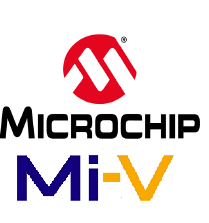PolarFire-Eval-Kit

View the Project on GitHub Mi-V-Soft-RISC-V/PolarFire-Eval-Kit
PolarFire Evaluation Kit Mi-V Sample FPGA Designs
This folder contains Tcl scripts that build Libero SoC v2025.2 design projects for the PolarFire Evaluation Kit. These scripts are executed in Libero SoC to generate the sample designs. All Configuration (CFG) design cores boot from memory at 0x8000_0000.
MI-V Extended Subsystem Design Guide Configurations:
- For Design Guide Configuration - DGC1: SPI Write & Boot refer to this DGC1 README
- For Design Guide Configuration - DGC3: PF uPROM Boot refer to this DGC3 README
- For Design Guide Configuration - DGC4: Basic Peripherals refer to this DGC4 README
PF_Eval_Kit_MIV_RV32_BaseDesign
| Config | Description |
|---|---|
| CFG1 | This design uses the MIV_RV32 core configured as follows: <ul><li>RISC-V Extensions: IMC</li><li>Multiplier: MACC (Pipelined)</li><li>Interfaces: AHBL Initiator (mirrored), APB3 Initiator</li><li>Internal IRQs: 1</li><li>TCM: enabled</li><li>System Timer: Internal MTIME enabled, Internal MTIME IRQ enabled</li><li>Debug: Enabled</li><li>An example program is stored in the LSRAM to boot out the box</ul> |
| CFG2 | This design uses the MIV_RV32 core configured as follows: <ul><li>RISC-V Extensions: IM</li><li>Multiplier: Fabric</li><li>Interfaces: AXI4 Master (mirrored), APB3 Initiator</li><li>Internal IRQs: 1</li><li>TCM: Disabled</li><li>System Timer: Internal MTIME enabled, Internal MTIME IRQ enabled</li><li>Debug: Enabled</li><li>An example program is stored in the LSRAM to boot out the box</ul> |
| CFG3 | This design uses the MIV_RV32 core configured as follows: <ul><li>RISC-V Extensions: I</li><li>Multiplier: none</li><li>Interfaces: APB3 Initiator</li><li>Internal IRQs: 1</li><li>TCM: enabled</li><li>System Timer: Internal MTIME enabled, Internal MTIME IRQ enabled</li><li>Debug: Enabled</li></ul> |
Instructions
Running Libero SoC in GUI mode
1. Open Libero SoC
2. Execute the script, Project -> Execute Script
3. Select the directory that the script is located in using the "..."
4. Select the script and select "Open"
5. In the arguments text box, enter the type of configuration you want e.g. "CFG1"
6. Select the "Run" button to execute the script
7. Once complete, a script report will be generated.
Libero executes the script and opens the Mi-V sample project targeted for a production silicon (PS) die. The script adds Timing constraints to the project for Synthesis, Place and Route, and Timing Verification. Additionally, I/O Constraints are added to the project for Place and Route. The project can now be taken through the remainder of the Libero SoC design flow.
Running Libero SoC in GUI mode, with Script Arguments
1. Open Libero SoC
2. Execute the selected script, Project -> Execute Script
3. Select the directory that the script is located in, using the "..."
4. Select the script and select "Open"
5. In the arguments text box, enter "CFG1 SYNTHESIZE PS"
6. Select the "Run" button to execute the script
7. Once complete, a script report will be generated.
In this example, the arguments “CFG1 SYNTHESIZE PS” are entered to take the production silicon (PS) die project through to Synthesis.
Libero executes the script and opens the Mi-V sample project targeted for a production silicon (PS) die. The script adds Timing constraints to the project for Synthesis, Place and Route, and Timing Verification. Additionally, I/O Constraints are added to the project for Place and Route. The project can now be taken through the remainder of the Libero SoC design flow.
Script Arguments
In the examples above the arguments “CFG1” and “CFG1 SYNTHESIZE PS” were entered. The complete set of script arguments are documented here.
First argument:
| Argument | Description | | ————————- |:—————| | CFG1..CFGn | Generate a sample design for the selected configuration | | DGC1 or DGC3 or DGC4 | Generate a MIV_ESS example design from the MIV_ESS v2.0 Design Guide (accessible from the Libero catalog) |
Second argument:
| Argument | Description | | ————————- |:—————| | SYNTHESIZE | Run synthesis on the design | | PLACE_AND_ROUTE | Run place and route on the design | | GENERATE_BITSTREAM | Generate the bitstream for the design| | EXPORT_PROGRAMMING_FILE | Export the programming file (.job) |
Third argument:
| Argument | Description | | ————————- |:—————| | PS | Build a base design targeted for ‘PS’ die | | ES | Build a base design targeted for ‘ES’ die |
Please note: Error messages will be generated if invalid arguments are applied.
Design Features
The Libero designs include the following features:
- A soft RISC-V processor operating at 50 MHz
- A RISC-V debug block allowing on-target debug using SoftConsole
- An Extended Subsystem with integrated peripherals
- Target SRAM/TCM memory (32kB)
- User peripherals: MIV_ESS, 2 Timers, UART, 2 GPIO Inputs and 4 GPIO Outputs (GPIOs use fixed configs for simplicity and better resource utilization)
The peripherals in this design are located at the following addresses.
MIV_RV32 based configurations
| Peripheral (MIV_ESS) | Address Start | Address End | | ——————————: |:————-:|:————–:| | PLIC | 0x7000_0000 | 0x70FF_FFFF | | UART | 0x7100_0000 | 0x71FF_FFFF | | Timer | 0x7200_0000 | 0x72FF_FFFF | | CoreTimer_0 / MIV_ESS_APBSLOT3 | 0x7300_0000 | 0x73FF_FFFF | | CoreTimer_1 / MIV_ESS_APBSLOT4 | 0x7400_0000 | 0x74FF_FFFF | | GPIO | 0x7500_0000 | 0x75FF_FFFF | | SPI | 0x7600_0000 | 0x76FF_FFFF | | uDMA | 0x7800_0000 | 0x78FF_FFFF | | WDOG | 0x7900_0000 | 0x79FF_FFFF | | I2C | 0x7A00_0000 | 0x7AFF_FFFF | | MIV_ESS_APBSLOTB_BASE | 0x7B00_0000 | 0x7BFF_FFFF | | MIV_ESS_APBSLOTC_BASE | 0x7C00_0000 | 0x7CFF_FFFF | | MIV_ESS_APBSLOTD_BASE | 0x7D00_0000 | 0x7DFF_FFFF | | MIV_ESS_APBSLOTE_BASE | 0x7E00_0000 | 0x7EFF_FFFF | | MIV_ESS_APBSLOTF_BASE | 0x7F00_0000 | 0x7FFF_FFFF | | SRAM/TCM | 0x8000_0000 | 0x8000_7FFF |